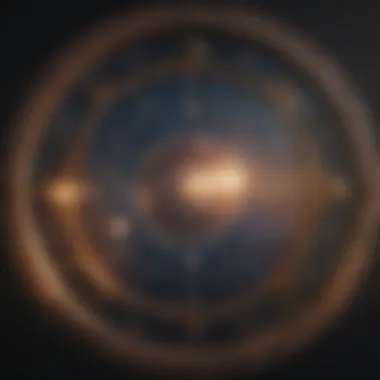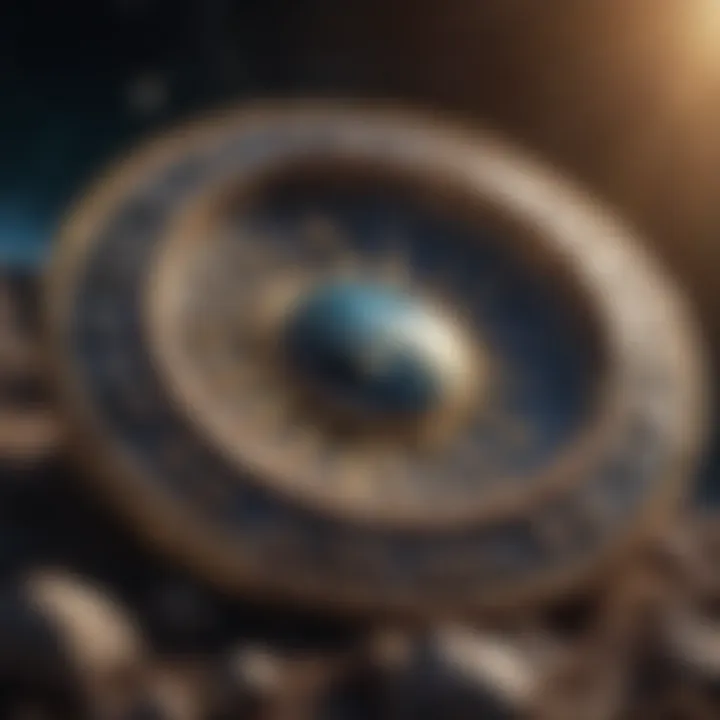Astrology Forecast: Understanding Celestial Impact


Intro
Astrology is more than just a celestial spectacle or a party trick found in magazines. It's a sprawling tapestry of experiences where cosmic events weave into the fabric of human lives. By examining how celestial bodies interact and influence our existence, we uncover layers of meaning that can guide us through decision-making, growth, and self-discovery. This article delves into astrology forecasts, revealing insights that extend beyond mere predictions.
In the journeys ahead, we will sift through the complexities of zodiac signs, the nitty-gritty of horoscope analysis, and how these celestial revelations can aid in personal growth. Understanding these facets isn't just about curiosity; it has real implications for the way we perceive our choices and potential.
Astrology's roots may be ancient, but its relevance is evergreen—acknowledging the resonances of the universe empowers us to embrace our individual paths. So, let’s embark on this exploration together, unearthing the gold nuggets in the cosmos that could shed light on our lives.
Understanding Astrology
Astrology, often seen as a mirror reflecting the celestial dance above us, holds a significant place in the personal narratives of many. It's not just about predicting the future but understanding how the positions and movements of celestial bodies shape individual experiences. This section explains why grasping the concept of astrology adds depth to one’s personal journey.
Astrology intertwines with daily life, serving as a roadmap that can guide decisions, highlight personal growth opportunities, and even provide moments of reflection. Recognizing the celestial influences often assists individuals in aligning their personal goals with the broader universal patterns.
Historical Context
The roots of astrology run deep, stretching back thousands of years. Civilizations such as the Babylonians and Greeks laid the groundwork for astrological practice. They observed the night sky, cataloging the movements of planets and stars, believing these celestial phenomena held messages about earthly affairs. As cultures evolved, so too did the interpretations of celestial relationships.
For instance, the ancient Egyptian belief system integrated astrology within their spiritual views, associating gods and goddesses with planetary influences. Each culture over time added its flavor to astrology, making it a rich tapestry of human insight and experience.
Theoretical Basis
At its core, astrology rests on the belief that the universe is interconnected. Each planet and star plays a role in a grand cosmic play. The positions of celestial bodies at the moment of a person's birth are said to influence their characteristics, behaviors, and significant life events.
Astrology relies on symbols like zodiac signs, houses, and aspects to create a language through which we can interpret these influences. Each sign represents specific traits and favored paths, while houses indicate various life sectors affected by these cosmic forces. Aspects are the angles between planets, explaining the complex interactions of energies that can enhance or challenge each other in an individual's life.
Astrology vs. Astronomy
While astrology and astronomy might appear intertwined, they represent distinct disciplines. Astronomy is the scientific study of celestial bodies, focusing on their features, movements, and phenomena. In contrast, astrology seeks to make sense of how these celestial movements impact human lives.
Despite some skepticism about astrology's predictive capabilities, many people still find value in its insights. The difference lies largely in purpose: where astronomy aims to understand the universe's mechanics, astrology aspires to interpret the implications of those mechanics on the human condition.
The cosmic influence of celestial bodies can provide clarity or chaos, depending on how we choose to interpret them.
The Components of Astrology Forecasts
Astrology is a vast web of connections and influences that can shape our lives in various ways. To navigate this celestial landscape effectively, it is crucial to understand the components that form the backbone of astrology forecasts. These components—Zodiac signs, planets, houses, and aspects—play a significant role in how we interpret celestial influences. Knowing these elements offers not only clarity but also a roadmap for personal growth and decision-making.
Zodiac Signs
Zodiac signs are the twelve constellations that form the basis of astrological reading. Each sign signifies different personality traits and life themes. For instance, someone born under Aries is often seen as bold and adventurous, while a Taurus tends to be more grounded and reliable. There’s more than just surface-level traits at play; the sign in which one is born affects emotional responses, motivations, and even relationships.
The Zodiac signs provide a narrative that can guide self-discovery. When individuals learn about their signs, they often find confirming truths about themselves. Additionally, understanding how different signs interact can help in navigating relationships. More than compatibility charts can highlight, it’s of utmost importance to consider each partner’s emotional landscape, which is deeply influenced by their respective Zodiac signs.
Learning about one’s Zodiac sign not only enriches personal life but can also serve as a powerful tool for understanding others.
Planets and Their Impacts
Planets in astrology represent different energies and functions influencing human behavior and fate. Each planet embodies specific qualities: for example, Venus is associated with love and beauty, while Mars is linked to aggression and drive. Knowing the planet's position in your birth chart can illuminate various areas of life, from love to career choices.
The position of planets in relation to your Zodiac sign can profoundly affect your emotional and mental state. For instance, if Jupiter is favorably aligned at the time of someone’s birth, it could indicate periods of abundant growth, whereas a challenging aspect with Saturn could predict areas of struggle or limitation.
By observing the movements of planets over time—known as transits—astrologers can make informed assessments of potential opportunities or hurdles you might encounter. This dynamic relationship with the cosmic bodies emphasizes that astrology isn’t just static; it’s a continuous interaction that evolves. Learning these planetary impacts encourages greater personal responsibility as one begins to see how choices align or clash with the cosmos.
Houses and Aspects
Lastly, the houses and aspects of a birth chart are particularly important for comprehensive astrological interpretation. The wheel of the birth chart is divided into twelve houses, each governing different aspects of life, including career, relationships, and spirituality. For instance, the seventh house relates to partnerships, while the tenth house corresponds to career and public life.
Aspects refer to the angles formed between two or more planets, revealing how they interact with each other. A harmonious trine can indicate supportive energies, while a challenging square might signify conflict or stress. The way planets sit within their houses and what aspects they form can deeply influence specific areas of life. For example, a strong aspect between Venus and Mars in the fifth house often indicates a vibrant romantic life, while a challenging aspect between Saturn and the Moon in the tenth house might suggest emotional difficulties in professional settings.
In summary, understanding these components helps paint a clearer picture of an individual's astrological profile. By analyzing Zodiac signs, discerning the impacts of planets, and interpreting the implications of houses and aspects, one can gain better insight into life's complexities. This knowledge not only facilitates personal growth but also equips individuals with the tools needed to make more informed choices in their lives.
Astrology serves as a personal guide that helps navigate the twists and turns of life, reflecting not just who we are, but also who we can become.


Personal Birth Charts
Astrology is not just a collection of stars mapped on distant skies; it is an intricate language that offers insights into individual personalities and experiences. This is where personal birth charts come into play, serving as a cosmic fingerprint for each person. A birth chart is essentially a snapshot of the heavens at the precise moment one enters this world, and its significance cannot be overstated. By understanding your unique chart, you can unlock insights that inform various aspects of your daily life, from career choices to love and relationships.
Creating a birth chart is the first step on this journey. This chart is created from the date, time, and location of your birth. It reveals your sun sign, moon sign, and ascendant, among other celestial positions. Each of these elements creates a distinct energy that influences your thoughts, emotions, and actions. The benefit of having access to this tailored information lies in its ability to enhance self-awareness—a critical tool for personal growth.
It is important to note that personal birth charts are not deterministic. They do not dictate your fate but rather offer possibilities and choices influenced by the energies at play during your birth. Understanding these energies can help you navigate life with a more profound sense of purpose and clarity.
"Your birth chart is not just a map of the stars; it’s a guide to understanding your life's challenges and strengths."
Creating Your Birth Chart
To begin creating your birth chart, you need three crucial pieces of information: your birth date, your exact birth time, and the place where you were born. The precision of birth time is particularly vital. A difference of just a few minutes can change your ascendant sign and the positions of various planets, leading to significant differences in interpretation. Free online tools like those available on sites like en.wikipedia.org can generate a basic chart without much hassle. However, delving deeper often requires consultation with an experienced astrologer, who can offer tailored insights.
Interpreting Key Elements
Once your birth chart is created, the real work of interpretation begins. At its core, the chart comprises elements divided among the planets, zodiac signs, and houses. Each plays a different role in shaping your character and life path.
- Sun Sign: This represents your core identity and ego. It's what drives you and commands your sense of self.
- Moon Sign: Your emotional self is represented here; it concerns who you are at your most vulnerable.
- Ascendant/Rising Sign: This reflects how others perceive you and the persona you present to the world.
Other significant planets may include Mercury (communication), Venus (love and relationships), and Mars (drive and energy). Each of these elements provides valuable insights into personal traits and tendencies.
Transits and Progressions
Astrology doesn’t just focus on the moment of birth; it also considers how planetary movements affect your birth chart over time. This is where transits and progressions come into play.
- Transits: These are the current positions of planets as they move through the sky and interact with the planetary placements in your birth chart. For instance, a challenging aspect from Saturn can signal challenges that require hard work, while a favorable aspect from Jupiter may indicate opportunities for growth and abundance.
- Progressions: This method involves moving forward your natal chart. Essentially, you can see how the positions of the planets would shift if you took the number of days since your birth as a number of years into your future. This gives another layer of insight, reflecting internal changes and shifts in focus over time.
In summary, personal birth charts are critical for every astrology enthusiast. They are not merely about predicting the future but rather about enriching your present experiences through better self-understanding. Whether you're assessing your own energies or navigating relationships, your birth chart is an invaluable resource that helps you listen to the cosmic whispers guiding your journey.
Types of Astrology Forecasts
Astrology forecasts serve as vital instruments for understanding daily, weekly, and monthly celestial influences, providing insights that can aid in decision-making and personal growth. Various types of forecasts cater to different temporal and personal needs, essentially reflecting the dynamic relationship between celestial bodies and our earthly experiences. By regularly engaging with these forecasts, individuals can use the knowledge gained to navigate life's ups and downs more smoothly. It’s like having a cosmic compass at your fingertips, guiding you through the whims and whirls of everyday life.
Daily Horoscopes
Daily horoscopes are perhaps the most familiar form of astrological insight for many. They pack a punch by offering brief but potent guidance tailored to your zodiac sign. Each day, astrologers examine the positions of the planets and their aspects to generate these bite-sized predictions.
- Importance: Daily horoscopes help ground you. They provide a quick reference to enhance your awareness of likely influences on that day. It’s a mini-check-in that can set a positive tone or alert you to possible challenges ahead.
- Benefits: They can foster proactive behavior. Knowing that you might face a tough scenario can prepare you mentally, transforming potential pitfalls into manageable situations.
- Considerations: While insightful, daily horoscopes are broad and can't replace personalized readings. They’re best viewed as guidelines rather than absolute truths.
"Daily horoscopes are like a morning cup of coffee; they wake you up to the celestial influences of the day."
Weekly Predictions
Transitioning from daily guidance, wekly predictions delve a bit deeper into the astrological currents at play. They include not just daily influences but also trends that may unfold over the week, helping you assess a broader temporal scene.
- Importance: They offer a clearer picture of the week ahead, capturing the ebb and flow of influences from the moon phases to planetary aspects.
- Benefits: With these insights, you can align your tasks with favorable days for productivity. It’s about optimizing your week—like scheduling a difficult meeting when your sign is in a strong influence.
- Considerations: Still, one must remember that free will plays a role. The predictions serve as a navigation tool, but ultimately, your choices shape your path.
Monthly Insights
At a broader level, monthly insights provide an expansive overview of what to expect as the lunar cycle updates and planets shift positions. These predictions emphasize longer trends and are often more strategic in nature.
- Importance: Monthly forecasts help plan significant events like interviews, starting new projects, or even relationships. They highlight ideal timings, allowing for more informed decisions.
- Benefits: Understanding longer-term influences can ease anxieties pertaining to change or uncertainty. It can create a calmer mindset to approach upcoming changes.
- Considerations: Yet, while informative, it’s essential to remember that they aren’t set in stone. Life can take unexpected turns, and flexibility remains crucial.
In summary, whether you consult daily horoscopes for immediate guidance, weekly predictions for a broader scope, or monthly insights for strategic planning, each level of astrological forecast serves a unique purpose in the journey of self-discovery and personal development.
The Role of Lunar Cycles
The lunar cycles serve as a significant compass in the realm of astrology, greatly influencing not just celestial movements but also human behavior. The moon’s phases and its various positions can offer intriguing insights into our moods, decisions, and even how we interact with the world. Its cyclic nature embodies change, suggesting phases of new beginnings, growth, attainment, and release. Thus, understanding these cycles can lead to a more harmonious interaction with our lives and the events within them.
Phases of the Moon
The moon goes through eight distinct phases during its monthly cycle, each carrying unique energies and meanings. Here’s a rough breakdown:
- New Moon: A time for new beginnings and setting intentions. It’s like a blank slate, perfect for launching new projects.
- Waxing Crescent: Growth is the theme here, as new opportunities arise. As the moon grows, so do energies and intentions.
- First Quarter: This phase brings clarity, prompting realizations. One might feel the push to act on the intentions set during the new moon.
- Waxing Gibbous: A time for refining ideas. It's a period when you prepare for what’s to come, making adjustments to ensure success.
- Full Moon: Emotions are heightened. It’s time to celebrate achievements but also to release what no longer serves you. The energy is powerful for introspection.
- Waning Gibbous: During this phase, reflect on what you’ve learned. It’s about gratitude and contemplation on your journey so far.
- Last Quarter: A time for letting go. This phase encourages closing chapters and releasing old energies.
- Waning Crescent: The final phase before a new moon. It’s an ideal time for rest and preparation for the renewal ahead.


Each phase can dramatically shift personal energy, so keeping track of these changes through a lunar calendar can be beneficial for planning personal projects, relationships, and self-care routines.
Impact on Personal Life
The moon doesn't just influence the ebb and flow of the tides; it subtly tugs at the strings of our inner lives. Research suggests that many people experience heightened emotions around the full moon, which can mirror shifts in mood. Even sleep patterns can fluctuate with these lunar phases. It's as if the moon's phases help guide our emotional landscape.
For instance, during the new moon, one might feel inspired to start a new fitness regimen or project at work, while the full moon could evoke a sense of completion, making it an excellent time to reflect on achievements or assess relationships.
Astrologers often encourage individuals to tune in to how they feel during each lunar phase, as this can inform better decision-making and personal growth. Keeping a
Astrology and Personal Growth
Astrology serves not just as a celestial compass but also as a mirror reflecting inner truths. In the realm of personal growth, it offers avenues for self-reflection and understanding that can be particularly beneficial. This section highlights how the insights derived from astrological principles can guide individuals in their journeys toward self-discovery, decision making, and relationship navigation. Engaging with astrology empowers people to peel back the layers of their personalities and life choices, prompting not just awareness but also actionable growth.
Self-Discovery through Astrology
Self-discovery is a journey where we continually learn who we are and what we value. Astrology can act as a valuable tool in this process. Each zodiac sign encapsulates distinct traits, tendencies, and inclinations. For instance, someone with a Moon in Pisces may gravitate towards emotional depth, empathy, and creativity, while a Sun in Aries might embody assertiveness and spontaneity.
Using birth charts, individuals can explore their unique celestial blueprints. Understanding positions of planets at one's birth can illuminate inner motivations and conflicts. Much like a treasure map, this chart might pinpoint strengths—determining where one’s talents lie—while also revealing challenges, such as dealing with assertiveness or commitment fears.
"Your astrological chart can highlight unique parts of your personality, just like a handwritten signature that differentiates you from others."
Engaging with these insights can catalyze profound personal growth. Reflecting on these characteristics can encourage individuals to embrace or address themselves more authentically.
Astrology for Decision Making
Decision making can often feel like navigating a ship through a foggy sea. In moments of uncertainty, astrology provides a valuable framework to help clarify thoughts and intentions. For instance, when looking at transits—motions of planets in relation to one's natal chart—people can align their choices with the cosmic energies present at any given moment.
When Mercury, the planet of communication, is in retrograde, it may be wise to delay important discussions or contracts. Conversely, if Venus is strong in a specific aspect, it might be a favorable time to pursue relationships or creative ventures. By aligning decisions with astrological patterns, individuals can harness the celestial winds to guide their ships, improving the likelihood of success.
Navigating Relationships
Relationships are often complex and multifaceted, resembling a tapestry woven with threads of emotion, communication, and shared experiences. Astrology offers insights into compatibility through analyzing the interplay between different signs and their elements.
For example, Earth signs (Taurus, Virgo, Capricorn) tend to be practical and grounded, while Air signs (Gemini, Libra, Aquarius) can bring a dynamic of communication and thoughtfulness. By understanding these fundamental differences, individuals can gain clarity on how to approach and nourish their relationships.
Astrology gets deeper when assessing synastry charts, which compare the natal charts of two individuals. This examination can elucidate areas of harmony and discord. A partner�’s Venus in your sign might bring warmth and affection, while challenging aspects might necessitate more patience or understanding.
In summary, astrology not only serves as a reflective lens for self-exploration but also provides a pragmatic toolkit for decision making and navigating the complexity of relationships, encouraging individuals to embrace their celestial influence as a means for growth and understanding.
Astrological Compatibility
Astrological compatibility is a crucial aspect of understanding how individuals resonate with each other based on their astrological charts. It goes beyond mere sun signs; it digs into the intricate facets of one's entire natal chart to determine the overall dynamics between two people. When one understands the influence of celestial bodies on personal relationships, it opens the door to richer interactions and fosters mutual growth.
The significance of this topic lies in its ability to facilitate deeper connections. When people grasp their compatibility strengths and weaknesses, they can navigate their relationships with more insight. For instance, why do some couples seem to get along effortlessly while others struggle? Often, the answer lies within the celestial map that each partner brings to the table. These insights are not just for romantic relationships; they apply to friendships, family, and even professional ties.
Understanding Compatibility Charts
Compatibility charts analyze both individuals' birth charts to uncover areas of harmony and discord. Each chart contains a wealth of information: the positions of the planets, the houses they reside in, and how they interact with each other. When you put two charts side by side, it’s like laying two portraits of the same scene.
For a practical approach, compatibility charts usually focus on:
- Sun Signs: The core essence of your personality and how you shine in the world.
- Moon Signs: The emotional landscape of an individual, indicating how they respond to feelings and nurturing.
- Rising Signs: The outward behavior and how one presents themselves to the world.
- Aspects: The angles formed between planets, reflecting the interaction of energies.
Collectively, these elements form a comprehensive view. One might find that a Leo sun can harmonize well with an Aries moon, yet clash if the other’s Venus presents an opposing energy that fuels tension.
Challenges and Strengths
Understanding the challenges and strengths that arise from astrological compatibility is crucial. Here’s where the rubber meets the road. Even the brightest prospects can be marred by certain crucial elements.
For example:
- Challenges: A square aspect between partners' Mars can ignite conflicts or urgency in action. Differences in communication styles, especially from Mercury positions, could lead to misunderstandings.
- Strengths: Conversely, if one partner’s Venus aspects the other’s Jupiter favorably, it can enrich relationships with love and optimism. Strong air placements in both charts might enhance conversation and intellect.
Once these dynamics are interpreted, partners can actively work on their strengths while being wary of pitfalls. It’s vital to have an open mind and recognize that differences are an opportunity for growth, not just a burden.


Using Astrology for Relationship Insights
Astrology provides valuable insights into relationships, helping individuals decipher their partners' motivations and responses. This understanding can lead to a profound shift in how partners interact and address their issues.
Key ways to utilize astrological insights in relationships include:
- Recognizing Patterns: Understanding recurring themes in past relationships can shed light on issues that need attention in the current bond.
- Timing Important Discussions: By considering lunar phases or planetary transits, partners can choose optimal times for honest conversations.
- Personal Growth: Each partner can focus on self-improvement through their astrological strengths, which will reflexively boost the relationship.
- Strengthening Bonds: Utilizing compatible traits to foster shared activities, aligning on mutual interests found through their charts can deepen the connection.
"In sum, astrology sheds light on the intricacies of human relationships, offering a roadmap for navigation and personal growth."
In essence, astrological compatibility is not about predicting doom and gloom; it can be a compass for navigating the waters of human emotions and connections. When embraced fully, it empowers individuals to cultivate healthier and more fulfilling relationships.
Astrology's Cultural Impact
Astrology's influence stretches beyond mere horoscopes and personal insights; it resonates deeply within cultures, shaping beliefs, customs, and actions. With the stars as silent witnesses, countless individuals have turned to astrology for guidance throughout history. Its significant impact can be understood by examining various facets, from its prevalence in modern society to the unique interpretations across different cultures. In this section, we unravel how astrology affects not just individual lives but also cultural landscapes.
Astrology in Modern Society
Astrology has not just survived the test of time; it has thrived in today’s fast-paced world. In an era marked by rapid change and uncertainty, many find solace in astrological predictions, valuing them as a compass amid chaos. Social media platforms have given birth to a renewed interest, facilitating discussions on astrology among people who may have never engaged with it prior.
- Community Engagement: Online forums and groups allow individuals to connect over shared beliefs, creating communities of enthusiasts who exchange insights and experiences.
- Personal Branding: Influencers utilize astrology in their narratives, catering to a demographic thirsty for personal growth strategies. By incorporating signs and horoscopes, they bolster their branding while enticing followers searching for meaning.
Astrology also intersects with mental wellness, as people use it for self-reflection and emotional clarity. Instead of treating it as mere entertainment, many have embraced it as a tool for personal development, connecting their personal narratives with the cosmic patterns of the universe.
Astrology in Various Cultures
The cultural tapestry of astrology weaves together a multitude of interpretations and practices globally. Each culture brings its own lens through which celestial bodies are perceived, creating a rich blend of astrological practices.
- Eastern Astrology: In Chinese astrology, the lunar calendar is pivotal, dividing years into animal signs. This system has led to unique cultural practices, such as the Lunar New Year celebrations that honor zodiac signs.
- Western Tradition: Western astrology focuses on the sun signs and birth charts, greatly impacting personal identity and how individuals perceive their place in the cosmos.
"Astrology serves as a bridge, connecting diverse cultures while illuminating personal journeys."
The interplay between these different astrological traditions elucidates how societies respond to celestial phenomena, often reflecting historical narratives and belief systems. These interpretations extend into literature, art, and even politics, illuminating significant cultural attitudes.
The Future of Astrology
As the world marches forward into an increasingly digital landscape, the future of astrology seems poised for evolution. The advent of technology, particularly artificial intelligence, is likely to revolutionize how astrology is practiced and perceived.
- Personalization and Tailoring: With advancements in algorithms, astrology apps now offer more personalized forecasts, catering to individual experiences. This might allow for insights that feel more relevant than ever.
- Integration with Science: There’s a growing dialog between astrology enthusiasts and skeptics, pushing for a more scientific approach. While some fervently defend astrology as a legitimate practice, others question its credibility leading to an ongoing discourse on its relevance in the modern age.
Astrological Tools and Resources
Astrology is not just a casual hobby for many; it is a profound exploration of the self, destiny, and the universe's influence on life. However, engaging with astrology effectively requires the right tools and resources. These are not just accessories but foundational elements that assist enthusiasts, from novices to seasoned practitioners, in navigating the astrological landscape. This section sheds light on key resources: books, online tools, and community engagement.
Books and Literature
The world of astrology is deep and rich, and books serve as one of the primary gateways into this fascinating realm. Classic texts, like Ptolemy's Tetrabiblos, provide foundational insights into traditional techniques, while modern guides cater to contemporary inquiries, offering fresh perspectives on age-old concepts. Here are some notable recommendations:
- The Only Astrology Book You'll Ever Need by Joanna Martine Woolfolk: This one covers everything from the zodiac signs to birth charts, making it great for beginners.
- Astrology for the Soul by Jan Spiller: A deep dive into the concept of lunar nodes and how they reflect one's karma and life lessons.
These texts not only furnish essential knowledge but also inspire self-reflection and curiosity, essential for astrological growth.
Online Tools and Applications
In an age dominated by technology, various online platforms have come to the fore, simplifying astrology practice for everyone. These tools range from birth chart calculators to mobile applications that provide daily, weekly, or monthly insights based on celestial movements. A few standout tools include:
- Astro.com: Known for its comprehensive chart generation and detailed report options, perfect for serious practitioners.
- Co-Star: This mobile app utilizes NASA data to deliver personalized horoscopes based on your natal chart.
- Astrologie: An engaging website that offers daily horoscopes, compatibility readings, and articles about astrological events.
Utilizing these tools can aid in immediate access to astrological insights, allowing users to track their growth and understand transits effectively.
Community and Discussion Forums
Astrology is a shared journey for many, and engaging with a community can deepen understanding and provide valuable support. Forums like Reddit host active communities where enthusiasts can discuss their experiences, share insights, and ask questions. Here are some popular threads to explore:
- r/astrology: A treasure trove of information, with real-time discussions around horoscopes, compatibility, and chart interpretations.
- Astrology Weekly Forums: This platform allows more in-depth discussions about various astrological methodologies and practices.
Involvement in such communities creates a sense of belonging and collaboration, enriching the individual experience of astrology.
"Astrology is a science of symbols. A symbol can be made meaningful in many ways, and thus each person can bring their own perspective. Building a community around that exploration can lead to profound discoveries."
By leveraging these tools—whether through insightful texts, handy online applications, or engaging community discussions—aspiring astrologers can cultivate a nuanced understanding of how celestial influences affect life decisions and personal growth. It becomes clear that with the right resources, the intricate tapestry of astrological insights can be woven more meaningfully.







